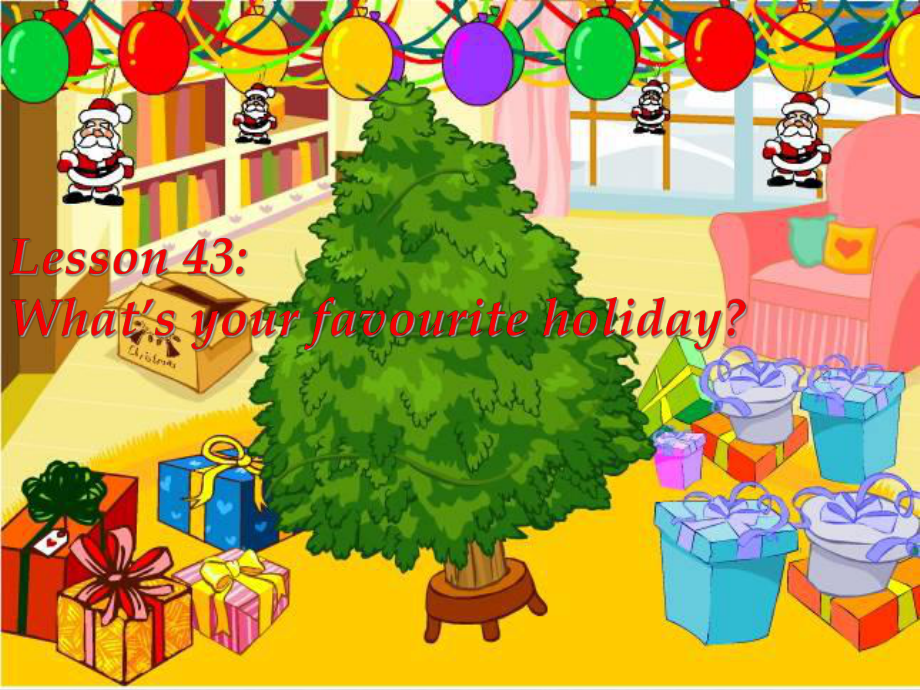《七年級英語下冊 Unit6 Winter in Canada Lesson 43課件 冀教版》由會員分享��,可在線閱讀����,更多相關(guān)《七年級英語下冊 Unit6 Winter in Canada Lesson 43課件 冀教版(13頁珍藏版)》請在裝配圖網(wǎng)上搜索��。
1、 holiday n 假日�����;假期 Easter n 復活節(jié) special adj 特殊的 water n. 水 together adv 一起 roll v. 滾動 stone n. 石頭 nation n. 國家 person n. 人 festival n. 節(jié)日 Christmas n. 圣誕節(jié) dance n&v. 舞��;跳舞 Sun Dance n. 太陽舞 What city do you live in? Is it your hometown? What special holidays do you have in your hometown? What is Deans f
2����、avourite holiday? Why? MW: Winter will be over. Spring will come and Easter, too. Easter is my favourite holiday. What about you? Whats your favourite holiday? D: I like Dinosaur Day. On that day, we dont sleep. We eat special grass and drink dirty water. We play a game together called “Roll the Sto
3、nes”. What a great day! MW: How interesting! What about you, Li Ming? L: My favourite holiday is Spring Festival. MW: Dean? D: Well, some of my people like Christmas and Easter. But we also have our own festivals. My favourite is the Sun Dance. We eat, drink, play games and do the Sun Dance together
4�����、. MW: What a wonderful festival, Dean! OK, class. You have homework. D: Oh, no! homework?! MW: Yes, homework. First, write about your favourite festival. Then, tell the class about it J: okay .I am going to talk about Christmas . L: And I am going to talk about Spring Festival. MW: Great! What is yo
5�����、ur favourite holiday or festival? Write a paragraph about it and present it to your classmates. What is it? Why do you like it? What do you do with your family?Winter will be over. 冬天即將結(jié)束����。over 1)adv. 結(jié)束,完了���。例如:Class is over. 下課了��。The storm is over. 暴風雨過去了���。2)可作介詞�,意為“在期間�,越過,穿過”��。例如:I read widely over the
6�����、 years. 多年來我廣泛閱讀�。What about you? 你呢?What about? 相當于How about ? 用來詢問對方的相關(guān)情況或用于表達建議�,其后接名詞或動名詞-ing形式。My father is a worker. What about your father? 我父親是工人�,你父親呢?We play a game called “roll the stones”. 我們玩一種叫“滾石頭”的游戲�。called 叫,此處called短語作定語,修飾前面的名詞game�,此處called可用named代替。例如:Do you know a boy called Li Nan
7���、? 你認識一個叫李南的男孩嗎?be called 可作謂語。例如:The girl is called Fang fang. 這個女孩叫芳芳��。call + 賓語 +賓語補足語, 此時call為“稱���,叫”之意�����。例如:We all call him Lao Li. 我們都叫他老李���。My favourite holiday is Spring Festival. 我最喜愛的節(jié)日是春節(jié)。holiday n. 假日���;節(jié)日休息����;假期(常用復數(shù))��。例如:She spent her holiday at the seaside. 她在海濱度過了假期����。拓展:holiday組成的詞組有:on holiday 在度
8、假for ones holiday 去度假during the holiday 在假期中the summer holiday 暑假the winter holiday 寒假But we also have our own festivals. 但我們也有自己的節(jié)日����。also adv. 也辨析:too �����, also, either三個詞都有“也”之意����,前兩個一般用于肯定句中��。too一般用于句末��,前邊用逗號隔開�����;也可位于句中�,前后都用逗號隔開。also一般位于句中���,位于助動詞�、be動詞���、情態(tài)動詞之后���,行為動詞之前。either常用于否定句中���。例如:He plays the piano, too. 他也彈鋼琴�����。I also like tomatoes. 我也喜歡西紅柿����。He isnt a doctor , either. 他也不是醫(yī)生����。I am going to talk about Christmas. 我準備談圣誕節(jié)。be going to + 動詞原形�����,意為“將要做某事”�,這是一般將來時的一種結(jié)構(gòu);另一種結(jié)構(gòu)是will /shall + 動詞原形��。例如:We are going to buy some new books. 我們打算買一些新書���。Are you going to visit the Great wall tomorrow? 明天你們要參觀長城嗎����?
 七年級英語下冊 Unit6 Winter in Canada Lesson 43課件 冀教版
七年級英語下冊 Unit6 Winter in Canada Lesson 43課件 冀教版

